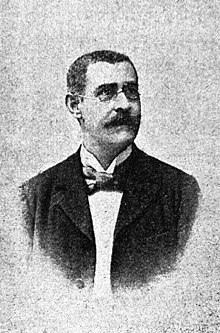Spyridon Lambros
Spyridon (Pavlou) Lambros also Spiridon Lampros ( Greek Σπυρίδων Λάμπρος , born April 8, 1851 in Corfu ; † July 23, 1919 in Skopelos ) was a Greek historian , sports official , politician and prime minister .
Origin and education
Spyridon Lampros was the youngest of the four sons of the numismatist Paulos Lambros (1820–1897) and Georgia Lambrou, née Frankopoulou, daughter of the goldsmith Dionysus Frankopoulos. After spending the first years of his life in Corfu, he and his family moved to the capital of Greece, Athens, in 1860 . He initially received private lessons from 1860 to 1863 and then attended the 2nd Gymnasium in Athens until 1867, where he was particularly influenced by the historian Aristides Kyprianos (1830–1869). Lambros later dedicated his doctoral thesis to the memory of this teacher. From an early age, Lambros showed strong literary interests. Together with his brother Michail (1841-1902) he wrote his first drama in 1861. Both took part in the founding of the literary and philanthropic association Parnassos in 1865 .
From 1867 to 1871 Lambros studied philology at the National University of Athens . During this time, Lambros published a report on the excavations of the Panathenaic Stadium in 1870 . From 1872 to August 1873, Lambros deepened his studies at Berlin University , where he attended lectures and exercises by Ernst Curtius , Johann Gustav Droysen , Moriz Haupt , Heinrich Kiepert , Adolf Kirchhoff and Theodor Mommsen . During this time he submitted his dissertation (in Greek) to the University of Leipzig on the cultic veneration of mythical founders of the Greek colonies , with which he was awarded a doctorate in 1873. phil. received his doctorate .
historian
Lambros also studied history at the universities in London , Paris and Vienna . In 1890 he was appointed professor of history and classical literature at the University of Athens . Between 1893 and 1894 and from 1912 to 1913 he was provost (dean) of the university. From 1907 he was a corresponding member of the Bavarian Academy of Sciences .
As a historian, he founded a new historical journal called Neos Hellinomnimon (Νέος Ελληνομνήμων) after 1903 , which examined the scientific and philosophical developments of the Greek-speaking world during the Byzantine and Ottoman era of Greece. With that he also had a considerable share in the research of the Middle Greek language .
Sports official
Lambros was also active as a sports official. In 1897, a few months after the first Olympic Games, he became president of the Panellinios Athens sports club, founded in 1891 . From this position he campaigned for the founding of the Greek Association of Amateur Athletes (SEAGS), of which he was first president from 1897 to 1906. In the same year it was decided to introduce the Panhellenic Games, which were organized for the first time in 1901. As Secretary General of the Olympic Committee, founded in 1901, he was also actively involved in organizing the 1906 Olympic Intermediate Games in Athens . He resigned from the post of Secretary General of the Olympic Committee in 1917.
Politician
When in 1916 Greece split into two government camps with Prime Minister Eleftherios Venizelos in Thessaloniki and King Constantine I in Athens due to the question of whether the country would enter the First World War , Lambros, who had previously been an ally of Venizelos as a liberal , took over on 10. October 1916 the order of the king to form a government. This government, which only controlled southern Greece, had to resign on February 5th, 1917 due to unrest in Athens. In particular, however, the recognition of the Venizelos government by the Allies of the First World War led to the failure of his government. After King Constantine I went into exile, Lambros withdrew completely from political life.
Lambros' daughter Lina Tsaldari also became a politician.
literature
- Walter Puchner : sv Lampros, Spiridon P. In: Mathias Bernath , Felix von Schröder (Hrsg.): Biographical lexicon for the history of Southeast Europe. Volume 3: L-P. Oldenbourg, Munich 1979, ISBN 3-486-48991-7 , pp. 5-6, online .
Remarks
- ^ Table of contents and complete index ( memento of October 23, 2015 in the Internet Archive ) of volumes 1–21, Athens 1930, also contains the biography of Lampros
Web links
- Publications
- Lambros, Spyros P. Publications in the bibliographic database of the Regesta Imperii . (German-language articles in the BZ )
- In addition, several works on the Neos Hellenomniom were published posthumously .
- Biographical sources and background information
- biography
- John Thomas Hero, Angela Constantinides Hero: Byzantine Monastic Foundation Documents (PDF; 211 kB) on the typicon of the Pantocrator monastery, the original of which was discovered by Lampros.
- Evi Koukouraki: From the Greek Wars of Liberation to the Present: History of Young Greece. 2003
- Domestic Policy 1897-1922
| predecessor | Office | successor |
|---|---|---|
| Nikolaos Kalogeropoulos |
Prime Minister of Greece 1916–1917 |
Alexandros Zaimis |
| personal data | |
|---|---|
| SURNAME | Lambros, Spyridon |
| ALTERNATIVE NAMES | Lampros, Spiridon |
| BRIEF DESCRIPTION | Greek politician and prime minister |
| DATE OF BIRTH | April 8, 1851 |
| PLACE OF BIRTH | Corfu |
| DATE OF DEATH | July 23, 1919 |
| Place of death | Skopelos |

